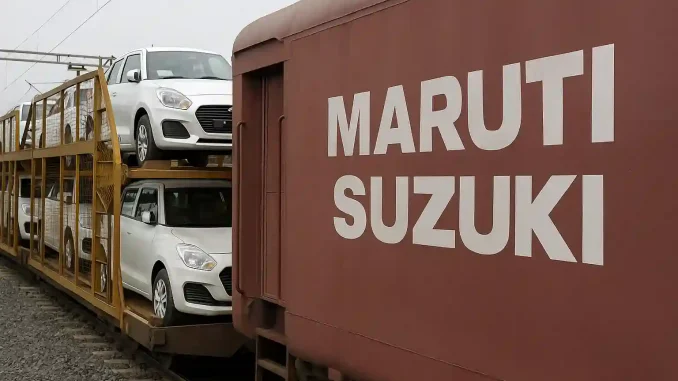
In a bold step toward enhancing sustainability, cutting logistics costs, and streamlining supply chains, Maruti Suzuki India Limited (MSIL)—the country’s largest carmaker—is significantly increasing its reliance on Indian Railways for transporting vehicles across the country. The company has announced an ambitious plan to dispatch 35% of its vehicles via rail by FY 2030–31, up from around 17% in FY 2023–24.
This strategic shift marks a defining moment in India’s evolving automotive logistics landscape, where rail-based transport is set to become a game-changer. It also reflects Maruti Suzuki’s deepening commitment to green mobility and efficient logistics, as it prepares for a future driven by scale, speed, and sustainability.
Why Railways? The Strategic Rationale
With production volumes expected to grow substantially over the next decade, transporting finished vehicles efficiently and sustainably is becoming a central concern for automakers. Traditionally, vehicle movement in India has heavily relied on road transport via car carriers, which, while flexible, are subject to rising fuel costs, traffic congestion, and environmental regulations.
Maruti Suzuki’s pivot toward railways is driven by multiple strategic and environmental considerations:
1. Cost Efficiency
Rail transport, despite higher upfront infrastructure costs, is significantly more cost-effective over long distances, especially when moving bulk shipments. According to industry estimates, moving cars by train can be 20–30% cheaper compared to road freight.
2. Environmental Sustainability
Railways are known to emit 80% less CO₂ per ton-kilometer than road transport. As Maruti pushes for carbon neutrality in its operations, using railways for logistics helps reduce the company’s logistics-related emissions footprint dramatically.
In FY 2023–24 alone, Maruti Suzuki claims it saved around 205 million liters of fuel and reduced CO₂ emissions by over 600,000 tonnes through rail-based logistics since it began the initiative.
3. Scalability and Speed
Railways offer faster and more scalable transport options when volumes are high. With dedicated automobile freight trains like New Modified Goods (NMG) rakes and Automobile Freight Trains Operators (AFTO) models, Maruti Suzuki can now transport 318–360 cars per rake, compared to 8–10 vehicles per road carrier.
Progress So Far: Setting the Tracks
Maruti Suzuki was one of the earliest auto companies in India to partner with Indian Railways. In 2014, it became the first automaker in India to obtain an AFTO license, allowing it to design and operate its own high-capacity rakes for vehicle movement.
Some key milestones include:
- Dedicated loading terminals in key manufacturing locations like Gurgaon, Manesar (Haryana), Hansalpur (Gujarat).
- Increasing rake deployment across long-haul routes to the Northeast, South India, and Eastern India.
- Regular use of double-decker railway wagons, specifically designed to carry vehicles without damage.
In FY 2023–24, Maruti Suzuki dispatched over 500,000 vehicles through the Indian Railways—accounting for around 17% of total domestic dispatches.
The 2030–31 Vision: A Green and Lean Supply Chain
By 2030–31, the company plans to more than double this percentage, aiming for over one-third of its vehicles to reach customers through the rail network. This would translate to over 1.2 million cars moved via trains annually, assuming continued growth in production volumes.
To enable this transformation, Maruti Suzuki is working closely with Indian Railways to:
- Expand loading/unloading infrastructure at both origin and destination points.
- Develop new railway sidings and hubs, especially in under-served markets in East and Northeast India.
- Invest in new rolling stock, including lightweight, enclosed wagons that reduce transit damage and loading time.
- Leverage digital systems for real-time rake tracking, inventory management, and automated scheduling.
The company also plans to deepen integration with multimodal logistics, combining rail and road for last-mile connectivity and improving turnaround times.
Indian Railways: Building the Backbone of Automotive Logistics
The Indian Railways, for its part, is actively supporting this shift. It has already designated automotive freight as a focus area and introduced policy measures such as:
- Incentivizing AFTO licenses for private players.
- Developing Dedicated Freight Corridors (DFCs), which will dramatically improve train speeds and reliability.
- Launching Rail Auto Hubs in strategic regions to facilitate vehicle storage, loading, and dispatch.
According to railway officials, the goal is to triple automobile freight volumes over the next decade, positioning Indian Railways as a vital partner to the Indian auto industry.
Challenges on the Track Ahead
Despite the momentum, several challenges still need to be addressed:
- Last-mile connectivity remains a bottleneck in many rural and Tier 2–3 cities.
- Infrastructure gaps in certain zones slow down loading/unloading cycles.
- Train availability and route congestion, especially on non-dedicated freight corridors, can cause delays.
- Damage control and quality assurance during transit remain concerns, although they have improved significantly in recent years.
Maruti Suzuki and Indian Railways are actively collaborating on these fronts to iron out operational inefficiencies and streamline processes.
Industry-Wide Implications
Maruti’s ambitious shift could have ripple effects across the Indian auto industry. With competitors like Hyundai, Tata Motors, and Kia also exploring increased rail logistics, the entire sector could soon see a structural transformation in how vehicles are moved across the country.
Increased rail transport will:
- Reduce pressure on highways
- Lower logistics costs for OEMs
- Improve delivery timelines
- Enhance sustainability credentials, especially as export volumes grow
Leave a Reply